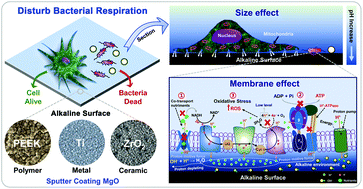当前位置:
X-MOL 学术
›
Biomater. Sci.
›
论文详情
Our official English website, www.x-mol.net, welcomes your
feedback! (Note: you will need to create a separate account there.)
A facile and universal strategy to endow implant materials with antibacterial ability via alkalinity disturbing bacterial respiration.
Biomaterials Science ( IF 5.8 ) Pub Date : 2020/01/07 , DOI: 10.1039/c9bm01793c Ji Tan 1 , Zixiao Liu 2 , Donghui Wang 3 , Xianming Zhang 2 , Shi Qian 4 , Xuanyong Liu 4
Biomaterials Science ( IF 5.8 ) Pub Date : 2020/01/07 , DOI: 10.1039/c9bm01793c Ji Tan 1 , Zixiao Liu 2 , Donghui Wang 3 , Xianming Zhang 2 , Shi Qian 4 , Xuanyong Liu 4
Affiliation

|
Multifarious strategies have been proposed to enhance the antibacterial ability of implant surfaces for preventing bacterial infection, however, developing facile and universal modification methods still remains extremely elusive. Herein, inspired by the fact that the electron transfer respiratory chain of bacteria is embedded in the membrane, we proposed a novel strategy of local alkalinity disturbing bacterial respiration to endow implant materials with antibacterial ability. As a demonstration, MgO was deposited on biomedical titanium via magnetron sputtering to regulate surface alkalinity. With the thickness of MgO films increasing, they exhibited an excellent antibacterial rate against both Gram-negative and positive bacteria. The antibacterial mechanism confirmed that the alkaline surface can disturb the bacterial respiration action via weakening the transmembrane proton concentration gradient, resulting in the blockage of energy metabolism and the increase of oxidative stress of bacteria. Cell experiments indicated that MgO films not only have no obvious cytotoxicity to osteoblast cells, but can also selectively kill bacteria and promote cell proliferation in the presence of both bacteria and cells. More importantly, the by-product of MgO was only the biocompatible Mg2+, reducing any concerns about potential toxic effects. Furthermore, sputtering alkaline MgO films was confirmed to work well on polyetheretherketone polymer and zirconia ceramic implants, which indicates that this strategy has broad prospects of clinical application for preventing implant-associated bacterial infection.
中文翻译:

通过碱度干扰细菌呼吸作用赋予植入材料抗菌能力的简便而通用的策略。
已经提出了多种策略来增强植入物表面的抗细菌能力,以防止细菌感染,但是,开发简便且通用的修饰方法仍然极为困难。在此,受细菌的电子传递呼吸链嵌入膜中这一事实的启发,我们提出了一种局部碱度干扰细菌呼吸的新策略,使植入材料具有抗菌能力。作为演示,MgO通过磁控溅射沉积在生物医学钛上以调节表面碱度。随着MgO膜厚度的增加,它们对革兰氏阴性菌和阳性菌均表现出优异的抗菌率。抗菌机理证实,碱性表面可通过削弱跨膜质子浓度梯度来干扰细菌的呼吸作用,从而导致能量代谢受阻和细菌氧化应激增加。细胞实验表明,MgO膜不仅对成骨细胞没有明显的细胞毒性,而且在存在细菌和细胞的情况下也可以选择性杀死细菌并促进细胞增殖。更重要的是,MgO的副产物只是具有生物相容性的Mg2 +,从而减少了对潜在毒性作用的担忧。此外,已证实溅射碱性MgO膜可在聚醚醚酮聚合物和氧化锆陶瓷植入物上很好地工作,
更新日期:2020-03-31
中文翻译:

通过碱度干扰细菌呼吸作用赋予植入材料抗菌能力的简便而通用的策略。
已经提出了多种策略来增强植入物表面的抗细菌能力,以防止细菌感染,但是,开发简便且通用的修饰方法仍然极为困难。在此,受细菌的电子传递呼吸链嵌入膜中这一事实的启发,我们提出了一种局部碱度干扰细菌呼吸的新策略,使植入材料具有抗菌能力。作为演示,MgO通过磁控溅射沉积在生物医学钛上以调节表面碱度。随着MgO膜厚度的增加,它们对革兰氏阴性菌和阳性菌均表现出优异的抗菌率。抗菌机理证实,碱性表面可通过削弱跨膜质子浓度梯度来干扰细菌的呼吸作用,从而导致能量代谢受阻和细菌氧化应激增加。细胞实验表明,MgO膜不仅对成骨细胞没有明显的细胞毒性,而且在存在细菌和细胞的情况下也可以选择性杀死细菌并促进细胞增殖。更重要的是,MgO的副产物只是具有生物相容性的Mg2 +,从而减少了对潜在毒性作用的担忧。此外,已证实溅射碱性MgO膜可在聚醚醚酮聚合物和氧化锆陶瓷植入物上很好地工作,









































 京公网安备 11010802027423号
京公网安备 11010802027423号